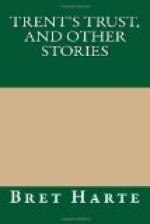“Yes,” he returned, with a quick laugh, “and it says hurry up—mighty quick—we’re tired waiting—so we’d better push on.”
“Why don’t you answer back with your revolver?” she asked.
“Haven’t got one,” he said.
“Haven’t got one?” she repeated in genuine surprise. “I thought you gentlemen who are traveling always carried one. Perhaps it’s inconsistent with your gospel of good-humor.”
“That’s just it, Miss Cantire,” he said with a laugh. “You’ve hit it.”
“Why,” she said hesitatingly, “even I have a derringer—a very little one, you know, which I carry in my reticule. Captain Richards gave it to me.” She opened her reticule and showed a pretty ivory-handled pistol. The look of joyful surprise which came into his face changed quickly as she cocked it and lifted it into the air. He seized her arm quickly.
“No, please don’t, you might want it—I mean the report won’t carry far enough. It’s a very useful little thing, for all that, but it’s only effective at close quarters.” He kept the pistol in his hand as they walked on. But Miss Cantire noticed this, also his evident satisfaction when she had at first produced it, and his concern when she was about to discharge it uselessly. She was a clever girl, and a frank one to those she was inclined to trust. And she began to trust this stranger. A smile stole along her oval cheek.
“I really believe you’re afraid of something, Mr. Boyle,” she said, without looking up. “What is it? You haven’t got that Indian scare too?”
Boyle had no false shame. “I think I have,” he returned, with equal frankness. “You see, I don’t understand Indians as well as you—and Foster.”
“Well, you take my word and Foster’s that there is not the least danger from them. About here they are merely grown-up children, cruel and destructive as most children are; but they know their masters by this time, and the old days of promiscuous scalping are over. The only other childish propensity they keep is thieving. Even then they only steal what they actually want,—horses, guns, and powder. A coach can go where an ammunition or an emigrant wagon can’t. So your trunk of samples is quite safe with Foster.”
Boyle did not think it necessary to protest. Perhaps he was thinking of something else.
“I’ve a mind,” she went on slyly, “to tell you something more. Confidence for confidence: as you’ve told me your trade secrets, I’ll tell you one of ours. Before we left Pine Barrens, my father ordered a small escort of cavalrymen to be in readiness to join that coach if the scouts, who were watching, thought it necessary. So, you see, I’m something of a fraud as regards my reputation for courage.”
“That doesn’t follow,” said Boyle admiringly, “for your father must have thought there was some danger, or he wouldn’t have taken that precaution.”
“Oh, it wasn’t for me,” said the young girl quickly.




